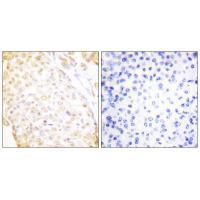
| WB | 咨询技术 | Human,Mouse,Rat |
| IF | 咨询技术 | Human,Mouse,Rat |
| IHC | 1/50-1/100 | Human,Mouse,Rat |
| ICC | 技术咨询 | Human,Mouse,Rat |
| FCM | 咨询技术 | Human,Mouse,Rat |
| Elisa | 咨询技术 | Human,Mouse,Rat |
| Aliases | Homeobox protein Nkx-3.1; NKX31; NKX3A; |
| Entrez GeneID | 4824; |
| WB Predicted band size | 38kDa |
| Host/Isotype | Rabbit IgG |
| Antibody Type | Primary antibody |
| Storage | Store at 4°C short term. Aliquot and store at -20°C long term. Avoid freeze/thaw cycles. |
| Species Reactivity | Human |
| Immunogen | Synthesized peptide derived from N-terminal of human NKX3. |
| Formulation | Purified antibody in PBS with 0.05% sodium azide. |
+ +
以下是3篇关于NKX3.1抗体的参考文献概述,供参考:
---
1. **文献名称**: "NKX3.1 as a Marker of Prostate Origin in Metastatic Tumors"
**作者**: Bowen, C. et al.
**摘要**: 该研究验证了NKX3.1抗体在免疫组化中的特异性,证明其可作为前列腺来源转移性肿瘤的生物标志物,尤其在PSA阴性病例中具有诊断价值。
---
2. **文献名称**: "Prostate-specific expression of the homeobox gene NKX3.1 during embryonic and post-natal growth"
**作者**: Bieberich, C.J. et al.
**摘要**: 文章阐明了NKX3.1在前列腺发育中的表达模式,并通过抗体检测证实其在胚胎和成体前列腺组织中的特异性,为前列腺癌研究提供分子基础。
---
3. **文献名称**: "Loss of NKX3.1 expression in human prostate cancers correlates with tumor progression"
**作者**: He, W.W. et al.
**摘要**: 研究利用NKX3.1抗体分析临床样本,发现其表达缺失与前列腺癌分期和转移相关,提示其作为肿瘤抑制基因的潜在作用。
---
4. **文献名称**: "NKX3.1 Stabilizes p53. Inhibits DNA Repair, and Promotes Cell Death"
**作者**: Ouyang, X. et al.
**摘要**: 该文献通过抗体介导的蛋白质检测,揭示了NKX3.1通过调控p53通路抑制DNA修复的机制,解释了其在抑制前列腺癌进展中的功能。
---
以上文献均聚焦于NKX3.1抗体的应用及其在前列腺癌生物学中的意义,涵盖诊断、分子机制及临床关联研究。
The NKX3.1 antibody is a critical tool in studying the NKX3.1 protein, a homeodomain-containing transcription factor encoded by the *NKX3-1* gene located on human chromosome 8p21.2. NKX3.1 plays a pivotal role in prostate development, epithelial cell differentiation, and maintenance of glandular architecture. It acts as a tumor suppressor, with reduced or lost expression observed in prostate intraepithelial neoplasia (PIN) and adenocarcinoma, making it a biomarker of interest in prostate cancer research.
NKX3.1 antibodies are widely used in immunohistochemistry (IHC) to identify prostate-specific tissue origin, particularly in distinguishing prostate carcinoma from other malignancies (e.g., bladder or colorectal cancers). Its nuclear staining pattern in normal and neoplastic prostate tissues underscores its diagnostic utility. Additionally, these antibodies aid in studying NKX3.1’s regulatory mechanisms, including interactions with androgen signaling pathways and DNA repair processes.
Beyond prostate cancer, NKX3.1 expression has been explored in breast and thyroid cancers, though its role remains less defined. Commercially available monoclonal and polyclonal antibodies vary in specificity, requiring validation for cross-reactivity with homologous proteins. Research also highlights NKX3.1’s epigenetic silencing via promoter hypermethylation in tumors, emphasizing its therapeutic and prognostic potential. Overall, NKX3.1 antibodies are indispensable in both basic research and clinical diagnostics, bridging molecular biology and pathology.
×